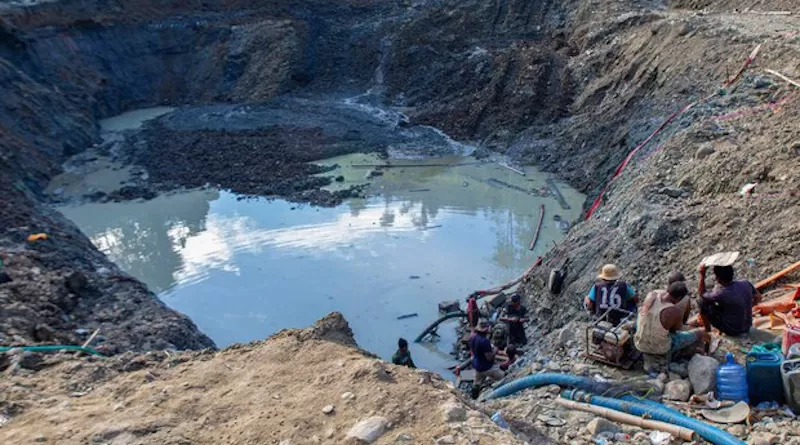Indonesia Must Act On Illegal Gold Mining Or Fall For Fool’s Gold – Analysis
By Muhammad Beni Saputra*
Indonesia’s illegal gold mining problems reveal deeper issues with local level corruption and economic inequality. In Sumatra, gold miners have complained about inconsistencies in the police’s tough security measures to eradicate mining. While there was a harsh crackdown on individual miners — with some ending up in jail — most oligarchs behind the lucrative business remain untouched.
Illegal gold mining (known in Indonesia as Pertambangan Tanpa Izin or PETI) is a controversial problem, which has worsened since the country’s decentralisation program in 1998. With the loosening of central government control and the diminished role of national oligarchs, local oligarchs were able to take control of the environmentally destructive mining sector.
There are generally two types of oligarchs in the PETI business. One is small-scale, local bosses who usually have several floating mining docks or holes. The other type is regional oligarchs whose business practice employs more modern machines, such as excavators and bulldozers.
Both types of oligarchs pose a serious threat to the environment and local communities, but regional oligarchs are far worse. Their excavators can reach impenetrable forests, while their political power, money and influence can buy security. North Sulawesi’s former police chief was once offered Rp 3 billion (US$200,000) per month by oligarchs for business protection. So it is not surprising that few regional oligarchs are brought to justice despite regular police and military raids across Indonesia.
Some Indonesians welcome the business opportunities that the oligarchs can bring to their villages. For those who are lucky enough to find gold on their land, PETI could mean an end to poverty. These landowners are usually offered 20 per cent of every rupiah generated from the illegal mining activity.
But PETI is not supported by all. In Teluk Langkap village, a bloody conflict between the villagers and PETI miners over river pollution resulted in the eradication of PETI for good. In Lubuk Bedorong village in the Sarolangun regency, people fiercely opposed PETI due to environmental exploitation, but their struggle has not been successful. The story is the same elsewhere in Indonesia, from Kalimantan to Papua.
Law No. 3/2020 on Mineral and Coal Mining allows regional governments to designate areas of up to 100 hectares as so-called People’s Mining Areas (Wilayah Pertambangan Rakyat or WPR) that can be mined freely by members of the public. The concept is a boon to regional oligarchs, who can lobby provincial governments to designate gold-rich areas as WPRs so they can expand their business legally — albeit at the expense of locals.
Though seemingly feasible, WPR is unlikely to offer a win-win solution because PETI generally operates in pristine forests or rivers. If this mining is legalised, there will likely be more mining activities taking place, leading to greater environmental damage. The rivers that are now muddy and chemically contaminated as a result of PETI will get worse — taking away villagers’ access to clean, drinkable water sources.
It is high time for Jakarta to strengthen its commitment to solving the PETI problem. Indonesian President Joko ‘Jokowi’ Widodo must cut off PETI oligarchs’ patronage networks from local governments and security apparatuses. It is an open secret that some politicians, police, military personnel and even village heads are involved in PETI.
Jokowi needs to introduce a measure to get all government officials, politicians and security personnel to sign an integrity pact that indicates their commitment to ending PETI. Such a policy has been in place in some regencies in Jambi, but its implementation remains far from effective. The Jokowi administration needs to demonstrate consistent law enforcement with strong political will to ensure everyone in the PETI business is held accountable before the law.
The government also needs to prioritise employment opportunities for unskilled labourers so that they do not turn to PETI to put food on the table in the first place.
The most effective solution would be to overcome the decade-long rubber price plunge from Rp 20,000 (US$1.4) per kilogram before 2010 to just Rp 9000 (US$0.6) today. The price drop has been an economic catastrophe for millions of villages in Jambi and other rubber-producing provinces, as daily survival relies on the commodity. Many of these residents would rather listen to a deal put forward by PETI oligarchs than leave their rubber plantations earning nothing — for all they know, their plantation soil could contain massive amounts of gold if the oligarchs are allowed to dig deep enough.
PETI continues to be a controversial issue in regional Indonesia, with clear winners and losers. Jakarta needs to address this problem now or see the oligarchs and their counterparts become too big to contain.
*About the author: Muhammad Beni Saputra is a lecturer at the Sultan Thaha Saifuddin State Islamic University Jambi (UIN STS Jambi).
Source: This article was published by East Asia Forum

